Choosing the right podcast hosting platform can be a daunting task, with a myriad of options available in the market. From the established players to the newcomers, each platform offers its own set of features, pricing, and capabilities. In this comprehensive review, we’ll dive deep into Transistor.fm, a podcast hosting service that has been making waves in the industry.
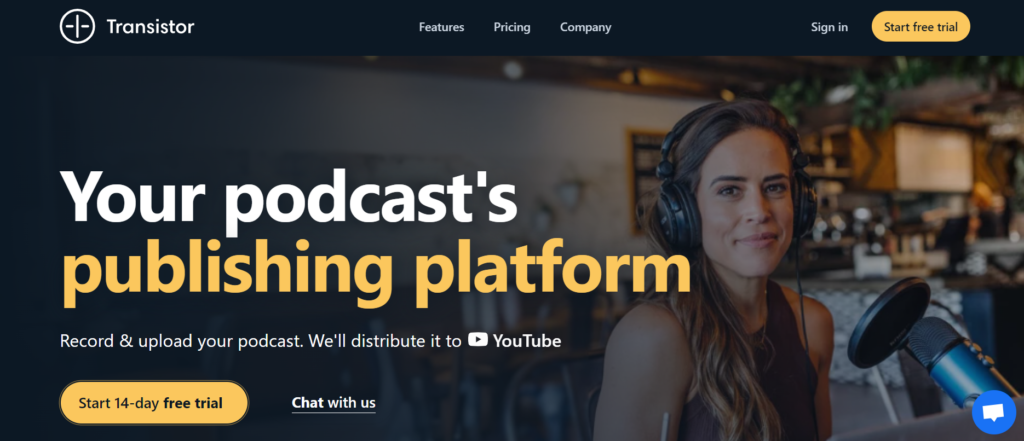
Transistor.fm was created with the goal of simplifying the podcasting process, providing a user-friendly platform that caters to both seasoned podcasters and those just starting out. As someone with 5 years of podcasting experience, I can confidently say that Transistor.fm has delivered on its promise, offering a seamless and intuitive experience.
In this in-depth review, we’ll explore the pros and cons of Transistor.fm, delve into its key features, and assess how it stacks up against the competition. Whether you’re considering switching from your current podcast host or just starting your podcasting journey, this article will provide you with the insights you need to make an informed decision.
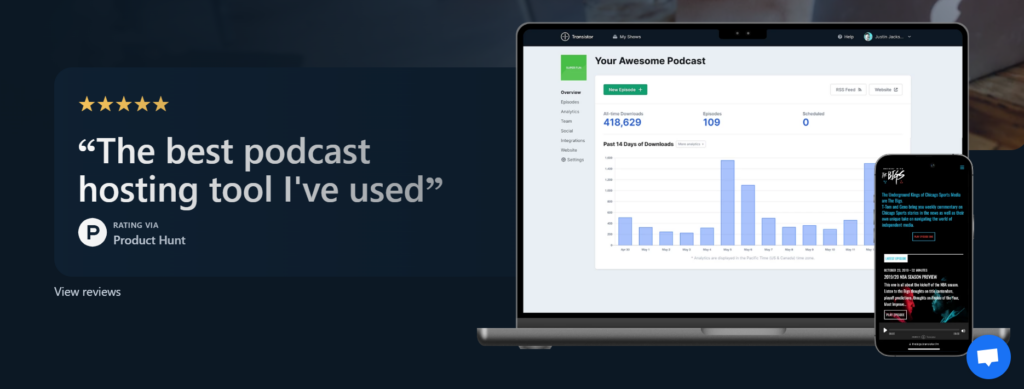
Pros
Easy to Use
One of the standout features of Transistor.fm is its exceptional ease of use. From the moment you sign up, the platform’s intuitive design and streamlined workflow make it a breeze to navigate. The onboarding process is straightforward, guiding you through the setup and ensuring you have everything in place to start publishing your podcast.
Intuitive Interface
Transistor.fm’s interface is thoughtfully designed, with a clean and uncluttered layout that puts the most essential features at your fingertips. The dashboard provides a clear overview of your podcast’s performance, with easy access to key metrics and settings. Navigating to different sections of the platform, such as uploading new episodes or managing your show’s details, is a smooth and seamless experience.
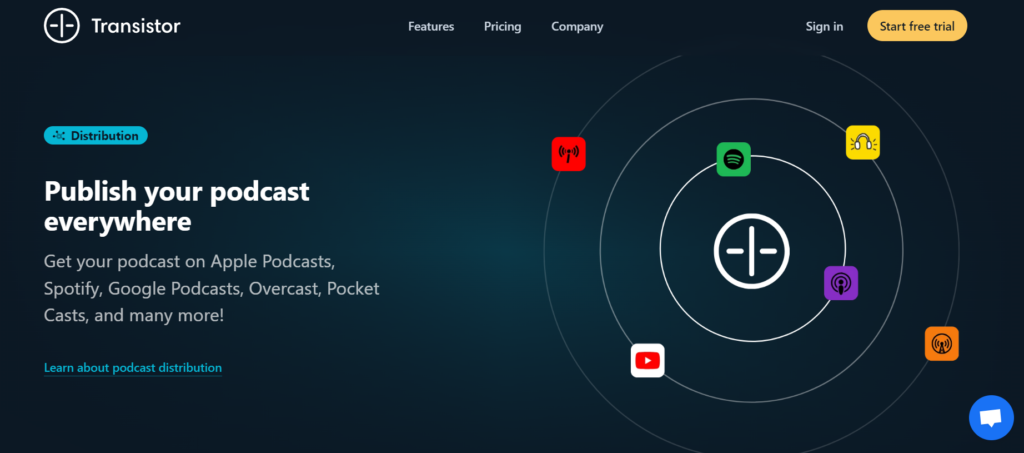
Streamlined Workflow
Transistor.fm has streamlined the podcast publishing process, making it effortless to get your episodes live. The process of uploading a new episode, writing the show notes, and scheduling the release is straightforward and can be completed in a matter of minutes. The platform’s user-friendly interface ensures that even the most tech-averse podcasters can quickly get the hang of it.
Intuitive Episode Management
Managing your podcast episodes on Transistor.fm is a breeze. The platform’s episode management tools allow you to easily upload, schedule, and publish your content. You can also make edits to existing episodes, update show notes, and even draft future episodes – all from a single, centralized interface.

Powerful Features
Despite its user-friendly approach, Transistor.fm doesn’t skimp on features. The platform offers a robust suite of tools and capabilities that cater to the needs of both beginner and seasoned podcasters.
Advanced Analytics
Transistor.fm’s analytics dashboard provides in-depth insights into your podcast’s performance. You can track key metrics such as episode downloads, listener engagement, and platform-specific data (e.g., Apple Podcasts, Spotify). The analytics are presented in a clean and intuitive way, making it easy to identify trends and optimize your content strategy.
Flexible Hosting Options
Transistor.fm offers a range of hosting options to suit your needs. Whether you’re looking to host a single podcast or manage multiple shows, the platform has you covered. You can even create private podcasts, which can be useful for exclusive content or internal communications.
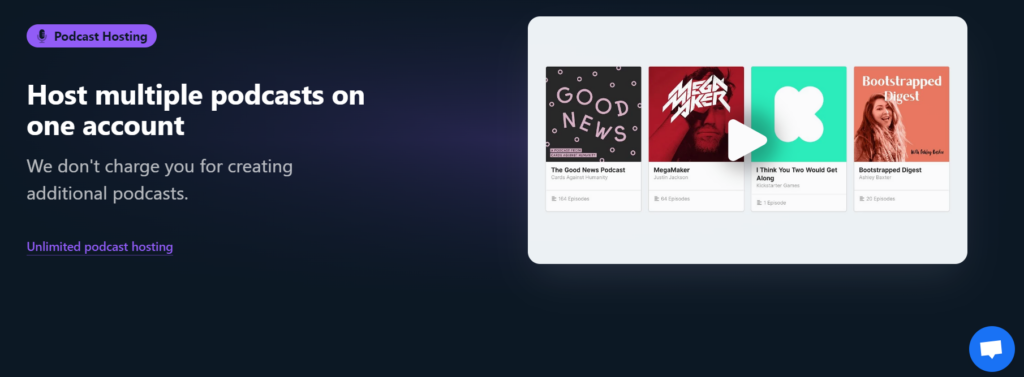
Embeddable Player
Transistor.fm’s embeddable player allows you to seamlessly integrate your podcast content into your website or other online platforms. The player is highly customizable, allowing you to match the branding and design of your website. This feature makes it easy to share your podcast with your audience and drive engagement.
Podcast Sites
One of Transistor.fm’s standout features is its ability to create beautiful, custom podcast websites for your show. These sites are designed to showcase your podcast, with options to display your episodes, show notes, and other relevant information. The site-building process is straightforward, and the platform offers a range of templates and customization options to choose from.
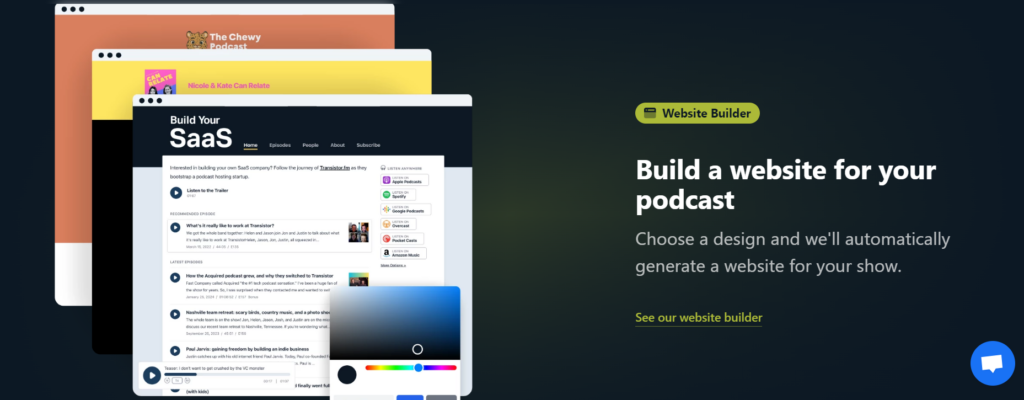
Fast and Helpful Support
Transistor.fm’s customer support is a key strength of the platform. The team is responsive and knowledgeable, providing quick and helpful assistance whenever you need it. Whether you’re facing a technical issue or have a question about the platform’s features, the support team is there to ensure you have a smooth experience.
Responsive and Knowledgeable
The Transistor.fm support team is known for its responsiveness and depth of knowledge. When I reached out with questions or concerns, I received prompt and informative responses that addressed my issues thoroughly. The team’s expertise in podcasting and the platform’s features was evident in their ability to provide tailored solutions.
Comprehensive Documentation
In addition to the responsive support team, Transistor.fm also offers comprehensive documentation and resources to help you navigate the platform. The knowledge base includes detailed guides, tutorials, and FAQs, covering a wide range of topics from getting started to advanced podcast management. This self-help material can be invaluable for those who prefer to troubleshoot and learn on their own.
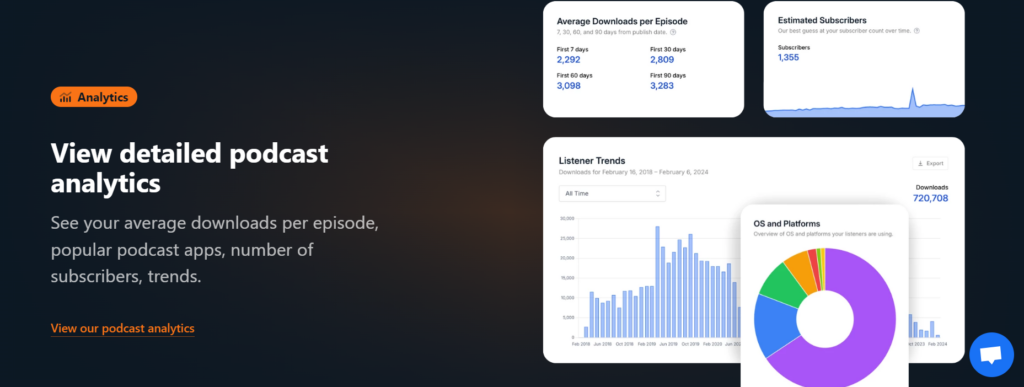
Proactive Communication
Transistor.fm takes a proactive approach to customer support, keeping users informed about platform updates, new features, and any relevant industry news. The team regularly shares informative blog posts and email newsletters, ensuring that you stay up-to-date with the latest developments in the world of podcasting.
Cons
No Free Plan
One potential drawback of Transistor.fm is the lack of a free plan. While the platform offers a 14-day free trial, there is no permanently free option, unlike some of its competitors. This may be a deterrent for those who are just starting out and want to test the waters before committing to a paid subscription.
Paid Plans Only
Transistor.fm’s pricing model is based solely on paid plans, with no free tier available. The plans start at $19 per month for a single podcast, and the pricing scales up as you add more shows or require additional features. This may be a barrier for some podcasters, particularly those with limited budgets or who are just beginning their podcasting journey.
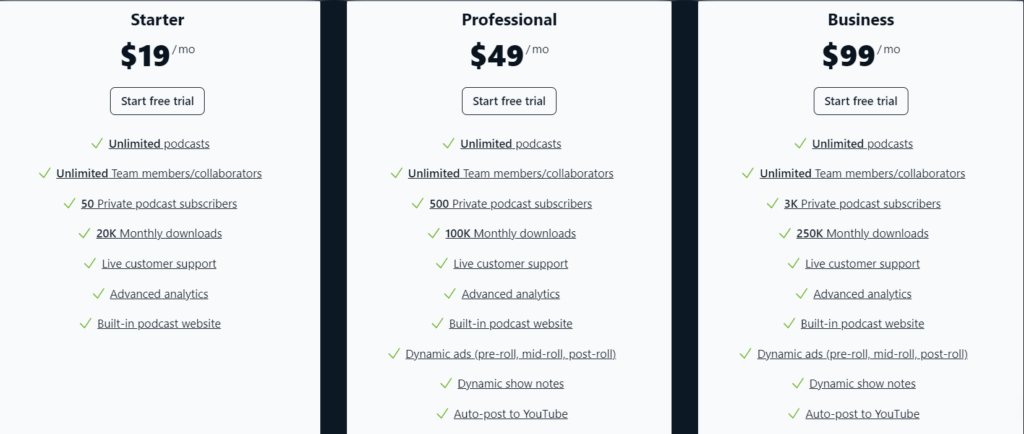
No Free Trial Extensions
While Transistor.fm does offer a 14-day free trial, there is no option to extend this trial period. If you find that you need more time to fully evaluate the platform, you’ll need to make a purchase decision within the initial two-week timeframe. This may be a concern for those who want more flexibility in their decision-making process.
Potential Limitations for Large Podcasts
Transistor.fm’s pricing structure and feature set may not be the best fit for podcasters with very large audiences or high episode download volumes. The platform’s pricing tiers are based on the number of podcasts and listeners, which could potentially become expensive for larger podcasts.
Scalability Concerns
As your podcast grows and your audience expands, the costs associated with Transistor.fm may become a concern. The platform’s pricing model may not scale as efficiently as some other hosting providers, particularly for podcasters with high download volumes or the need to manage multiple shows.
Potential Feature Gaps
While Transistor.fm offers a robust set of features, some larger or more complex podcasts may require additional functionality that the platform does not currently provide. This could include advanced analytics, enterprise-level collaboration tools, or specialized integrations with third-party platforms.
Key Points
Ease of Use
When judging the ease of use of a podcast host, I’m looking at two areas: how easy is it to get started and how easy is it to publish new episodes. Transistor excelled at both.
As soon as you get started, it becomes obvious how much thought was put into every design decision because Transistor is as intuitive to use as an app can be. Without reading any docs or needing to click through dozens of windows to find the right options, I quickly imported my podcast and got everything set up. I wish that during the import process they kept me up-to-date on the status, but importing 150 episodes took less than 30 minutes so it wasn’t that big of a deal.

Publishing new episodes is also a breeze. The episode upload process is straightforward, and the platform provides helpful tools for writing show notes, scheduling, and distribution. I found that I was able to get new episodes published in a fraction of the time it took with my previous host.
Overall, Transistor.fm’s focus on ease of use is one of its biggest strengths. The platform is designed to make the day-to-day tasks of podcasting as simple and streamlined as possible, which is a huge advantage for both new and experienced podcasters.
Cost
Transistor.fm’s pricing structure is relatively straightforward, with three main plan options:
| Plan | Price |
|---|---|
| Starter | $19/month |
| Growth | $49/month |
| Enterprise | $99/month |
The Starter plan includes hosting for a single podcast, 10,000 downloads per month, and basic analytics. The Growth plan doubles the download limit and adds more advanced features, while the Enterprise plan is designed for larger podcasts with up to 100,000 downloads per month.
It’s worth noting that Transistor.fm does not offer a free plan, which may be a deterrent for some podcasters, especially those just starting out. However, the platform does provide a 14-day free trial, which gives you ample time to test out the features and see if it’s a good fit for your needs.
When comparing Transistor.fm’s pricing to other podcast hosting providers, it falls somewhere in the middle. It’s not the cheapest option, but it’s also not the most expensive. The value proposition really comes down to the platform’s ease of use, robust features, and high-quality support.
Hosted Site
One of Transistor.fm’s standout features is its ability to create beautiful, custom podcast websites for your show. These sites are designed to showcase your podcast, with options to display your episodes, show notes, and other relevant information.
The site-building process is straightforward and intuitive, with a range of templates and customization options to choose from. You can easily customize the branding, layout, and overall aesthetic of your podcast site to match the look and feel of your show.
The hosted sites are also highly functional, with features like an embeddable player, episode archives, and subscriber management tools. This makes it easy to create a professional-looking, standalone presence for your podcast without the need for additional web development.
One potential downside is that the hosted sites are only available as part of Transistor.fm’s paid plans, with no option to use the platform’s hosting services without the site. This may be a drawback for podcasters who already have an established website and prefer to host their podcast content elsewhere.
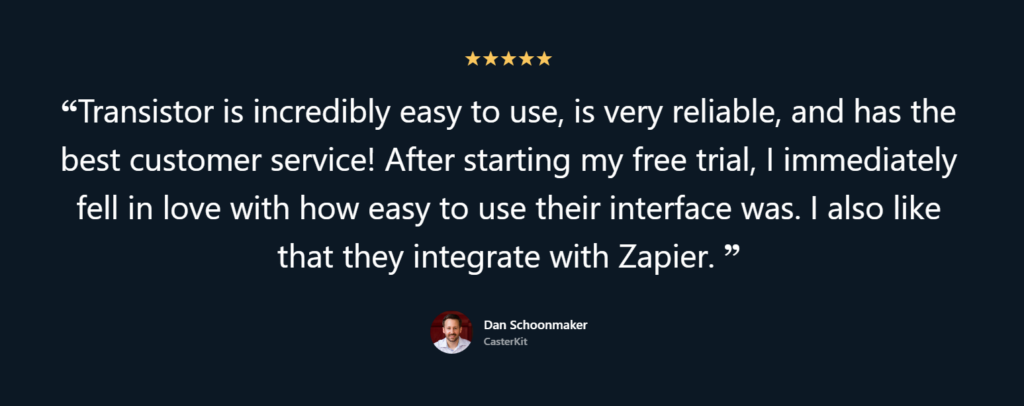
Embeddable Player
Transistor.fm’s embeddable player is another key feature that sets the platform apart. The player allows you to seamlessly integrate your podcast content into your website or other online platforms, making it easy to share your episodes with your audience.
The player is highly customizable, with options to match the branding and design of your website. You can adjust the colors, fonts, and layout to ensure a seamless integration with your existing online presence.
The embeddable player also provides basic playback controls, such as play, pause, and skip, as well as the ability to display episode details and artwork. This helps to create a consistent and professional listening experience for your audience, whether they’re accessing your podcast on your website or a third-party platform.
One potential limitation of the embeddable player is that it doesn’t offer the same level of advanced features and customization options as some standalone podcast players. However, for the majority of podcasters, the Transistor.fm player provides a simple and effective way to integrate their content into their online presence.
Support for Multiple Podcasts
Transistor.fm is designed to handle multiple podcasts within a single account, making it a suitable option for podcasters who manage more than one show.
The platform’s pricing structure scales based on the number of podcasts you host, with the ability to add additional shows as your portfolio expands. This flexibility is particularly useful for network-style podcasts, content creators, or businesses that produce multiple audio programs.
When managing multiple podcasts, Transistor.fm provides a centralized dashboard that allows you to easily navigate between your different shows. You can publish episodes, track analytics, and configure settings for each podcast independently, ensuring that your content and branding remain distinct.
One potential drawback is that the platform’s pricing may become more expensive as you add more podcasts to your account. However, the ability to manage all your shows from a single platform can be a significant time-saver and streamline your overall podcasting workflow.

Support for Private Podcasts
Transistor.fm offers the ability to create private podcasts, which can be useful for a variety of scenarios, such as:
- Exclusive content for paid subscribers
- Internal communications within an organization
- Training or educational materials for a specific audience
The process of setting up a private podcast is straightforward, with options to control access and manage subscriber permissions. You can choose to make your private podcast available to a specific email list, a custom domain, or even password-protected.
This feature can be particularly valuable for podcasters who want to offer exclusive content, protect sensitive information, or create a more intimate listening experience for their audience. It adds an extra layer of control and flexibility to the Transistor.fm platform.
It’s worth noting that the private podcast feature may incur additional costs, depending on the number of subscribers or the specific requirements of your use case. However, for those who need this functionality, Transistor.fm provides a reliable and user-friendly solution.
Analytics
Transistor.fm’s analytics dashboard provides in-depth insights into your podcast’s performance, allowing you to track key metrics and optimize your content strategy.
Some of the key analytics features include:
- Episode downloads: Track the number of downloads for each of your podcast episodes.
- Listener engagement: Understand how your audience is engaging with your content, including drop-off rates and listening patterns.
- Platform-specific data: Access detailed insights into your podcast’s performance on platforms like Apple Podcasts, Spotify, and Google Podcasts.
- Custom reporting: Create custom reports to analyze the data that matters most to your podcast.
The analytics are presented in a clean and intuitive way, making it easy to identify trends and gain valuable insights. The dashboard provides a clear overview of your podcast’s performance, with the ability to dive deeper into the data as needed.
One potential area for improvement is the ability to integrate Transistor.fm’s analytics with third-party tools, such as Google Analytics or audience intelligence platforms. While the platform’s built-in analytics are comprehensive, some podcasters may prefer a more integrated approach to their data analysis.
Support
Transistor.fm’s customer support is widely regarded as one of the platform’s strongest assets. The team is known for its responsiveness, knowledgeability, and dedication to ensuring a smooth experience for its users.
When I reached out to the Transistor.fm support team with questions or concerns, I was consistently met with prompt and informative responses. The support staff demonstrated a deep understanding of the platform’s features and were able to provide tailored solutions to my specific needs.
In addition to the responsive support team, Transistor.fm also offers a comprehensive knowledge base and resource library. The platform’s documentation covers a wide range of topics, from getting started to advanced podcast management, and serves as a valuable self-help resource for those who prefer to troubleshoot and learn on their own.
One aspect of Transistor.fm’s support that stands out is the team’s proactive communication. The platform regularly shares informative blog posts, email newsletters, and updates, keeping users informed about platform changes, new features, and relevant industry news. This level of engagement helps to foster a sense of community and ensures that podcasters using Transistor.fm feel well-supported.
Overall, Transistor.fm’s customer support is a significant strength of the platform, providing a level of assistance and guidance that can be invaluable for both new and experienced podcasters.
My Take
After extensively reviewing Transistor.fm, I can confidently say that it is a robust and user-friendly podcast hosting platform that offers an impressive set of features and capabilities. The platform’s focus on ease of use, powerful analytics, and high-quality customer support make it an attractive option for podcasters of all levels.
One of the standout features of Transistor.fm is its intuitive interface and streamlined workflow, which allow you to quickly get your podcast up and running and publish new episodes with ease. The platform’s episode management tools, embeddable player, and hosted site options also add significant value, making it easier to create a professional-looking online presence for your podcast.
While Transistor.fm may not be the cheapest podcast hosting option on the market, its pricing structure is reasonable, and the value it provides in terms of features and support is well worth the investment. The lack of a free plan may be a drawback for some, but the 14-day free trial offers a good opportunity to test the platform and determine if it’s the right fit for your podcasting needs.
One potential area for improvement is the platform’s scalability, particularly for larger podcasts with high download volumes or the need to manage multiple shows. In these cases, the pricing structure and feature set may not be as well-suited as some of the more enterprise-focused podcast hosting providers.
Overall, Transistor.fm is an excellent choice for podcasters who value ease of use, powerful features, and exceptional customer support. The platform’s solid performance and commitment to simplifying the podcasting process make it a strong contender in the crowded podcast hosting landscape.
Conclusion
In the ever-evolving world of podcast hosting, Transistor.fm has carved out a unique niche by prioritizing user experience and delivering a feature-rich platform that caters to the needs of both novice and experienced podcasters. With its intuitive interface, robust analytics, and top-notch customer support, Transistor.fm stands out as a reliable and effective solution for hosting and distributing podcasts.
While the platform may not be the most budget-friendly option available, the value it provides in terms of features, ease of use, and support justifies the cost for many content creators. The ability to host multiple podcasts, set up private feeds, and access detailed analytics make Transistor.fm a comprehensive tool for managing and growing a podcasting audience.
Overall, if you’re looking for a podcast hosting platform that prioritizes quality, simplicity, and support, Transistor.fm is definitely worth considering. Whether you’re just starting out in the world of podcasting or looking to take your existing show to the next level, Transistor.fm offers a solid foundation to build upon and elevate your podcasting experience.